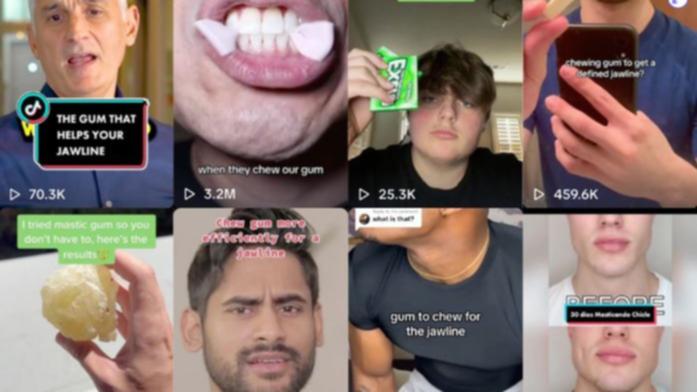Gen Z boys are chewing hard gum to try and chisel their jawlines—dentists say it may do ‘more harm than good’
If you search ‘facial fitness chewing gum’ on TikTok, you’ll see dozens of videos of young men — from late teens to early 20s — chewing gum that touts one eyebrow-raising benefit: a chiselled jawline.

Impossible beauty standards aren’t just for teen girls.
In fact, the desire to look and feel older has always existed among teenagers, including young men. You can often see the struggle to adhere to these standards play out online. Most recently Gen Z boys have gravitated to a unique new trend.
If you search “facial fitness chewing gum” on TikTok, you’ll see dozens of videos of young men — from late teens to early 20s — chewing gum that touts one eyebrow-raising benefit: developing a chiselled jawline.
Sign up to The Nightly's newsletters.
Get the first look at the digital newspaper, curated daily stories and breaking headlines delivered to your inbox.
By continuing you agree to our Terms and Privacy Policy.Many of the young men in the videos claim they chew the rock-hard gum for 10 minutes every single day.
The teen boys who follow this trend want to shed their youthfulness and look more like the models and influencers they idolize online. 72% of teenagers polled by skincare company Curology said the beauty standards that social media perpetuates cause them to feel pressure to look perfect.
“When we’re younger, we have a little bit more cheekiness to our profile. So, people may want to quickly jump into the adult look by trimming their faces down and trying to chew on these hard substances,” says Tyrone Rodriguez, a practising dentist for over 20 years.
“But the reality is people need to just embrace the stage they’re at in their youth.”
Brands like Jawliner, Jawz Gum and Stronger Gum sell these “facial-fitness gums” that they claim can help create a more defined jawline. Some products have a starting price of $22.
But can chewing this type of gum actually achieve those results? More importantly, is it even safe to do? Here’s what Rodriguez, who is also an American Dental Association spokesperson, says about the trend.
‘You can actually create more harm than good’
If we look back in time, “there is a history [of] our diets playing a role in shaping our face and jaw,” says Rodriguez.
“We have muscles around our face that connect with our jaw, and help with opening and closing and chewing. And depending on how hard our foods get, we will start to exercise those muscles more.”
While there may be a visible difference in the sharpness of a person’s jawline if they add hard foods to their diet daily, “any visible effects of chewing hard gum would be, at best, minor and temporary,” dentists told The New York Times.
A 2019 study found that a diet of hard foods led to a change in the jaw structure of mice. Companies who claim their gum can chisel a person’s jawline often refer to a 2018 study with 19 participants that associated chewing gum with a stronger bite force, the NYT reports.
“I would equate it to going to the gym,” Rodriguez tells CNBC Make It. “Just like anybody going to the gym, you can definitely overdo it.”
Chewing hard gum if you’re not used to tougher foods can cause soreness and “may even trigger problems with the joints that you have on the right and left side known as the TMJ, the temporomandibular joints,” he adds. “You can actually create more harm than good.”
The ADA noted the possibility of inflammation and jaw pain from chewing gum excessively in their newsletter, “ADA Morning Huddle.” The newsletter also warned that “some of the facial-fitness gum varieties may contain caffeine and vitamin B5, which can be a laxative in higher doses.”
A spokesperson for the company, Jawliner, told the NYT that a person should chew their product for no longer than 10 minutes every other day to avoid injury.
Rodriguez strongly advises that if you notice “you’re having pain if you’re having to shift in how you bite, meaning that you’re biting your tongue or cheek more, or if you’re noticing suddenly you’re getting headaches, stop immediately.”
